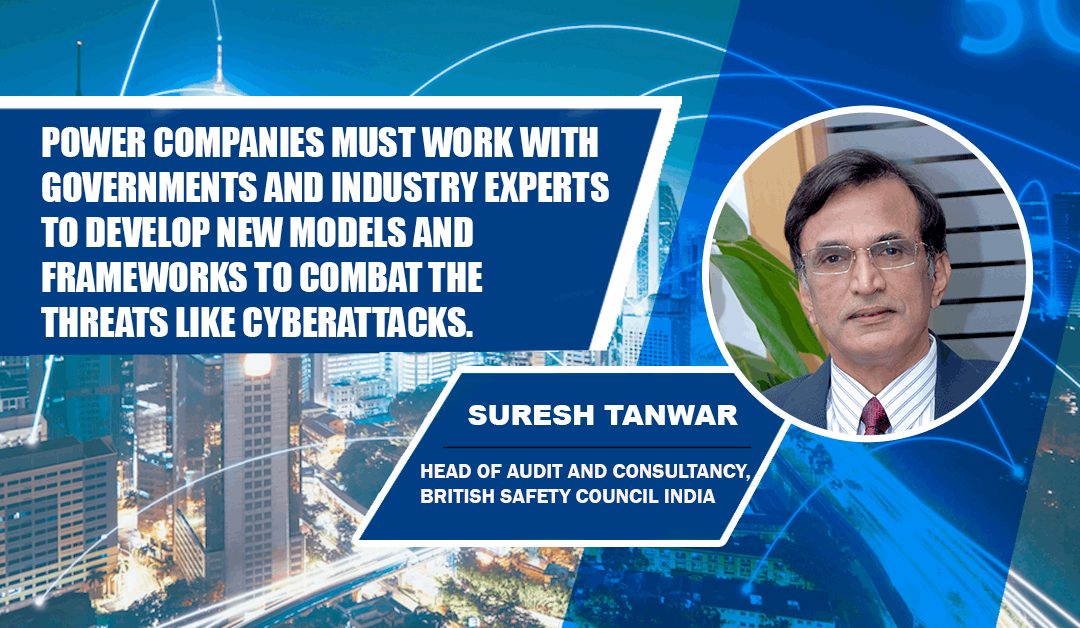Cyber security for critical infrastructure projects is a growing concern
By EPR Magazine Editorial June 26, 2021 5:34 pm IST
By EPR Magazine Editorial June 26, 2021 5:34 pm IST

In an interview with EPR Magazine, Suresh Tanwar, Head of Audit and Consultancy, British Safety Council India, talks about the safety issues associated with power infrastructure and the way forward for a safer environment.
What are the major safety issues associated with power generation, transmission, and distribution infrastructure?
Modern power plants are much safer now than they used to be back in the day. That being said, employees working in the power sector still encounter many hazards. Common hazards include electrical shocks and burns, boiler fires and explosions and contact with hazardous chemicals apart from several other hazards. These hazards depend also on the type of power plant itself. In India, coal-fired power plants meet more than 50 percent of the energy demand, followed by hydro-electric and nuclear power plants. Such power plants are prone to hazards due to dust, heat, noise, vibration, radiation and disposal of hazardous waste. When it comes to power transmission and distribution, in India, high voltage transmission line projects are executed with the help of manual and semi-automated work. The hazards here include electrocution or fall from heights while performing stringing work. Another major safety issue is an ‘arc blast’ or ‘arc flash’ which is a type of electrical explosion and among the complex hazards that has come to the forefront of electrical safety.
Hydro power projects are vulnerable to many safety threats associated with natural calamities like floods. What safety precautions are imperative for these projects?
Hydropower projects are vulnerable to natural disasters caused by floods, cloud bursts, Glacial Lake Outburst Floods (GLOFs), avalanches, landslides, rockslides and earthquakes. Releasing water safely from dams during floods or heavy rains presents a critical operational challenge. The challenge for flood management at hydropower facilities is to prevent or minimise the impacts of damovertopping on downstream communities, property, agriculture and ecosystems, while also protecting the dams themselves against operational failure and other damage. In France, the engineers developed an improved flood discharge system that helps to release water safely from dams during heavy precipitation events. The increased ‘crenelated’ surface area of the system provides an additional spillway to manage increased water flow. They were able to manage much higher flow levels and provide a safer solution than gated systems, with minimal risk of malfunction and easier evacuation of floating debris.
According to some studies the resilience of critical infrastructure systems, such as an electric power network, to natural disasters should include both the physical capacity of the power systems (transformation substations, transmission lines, etc.) and the organisational capacity of the operating groups. The four necessary properties of a resilient system should include robustness (ability to withstand a shock), redundancy (functional diversity), resourcefulness (ability to mobilise when threatened) and rapidity (ability to contain losses and recover in a timely manner). It is important to demonstrate how each of them can be operationalised in the context of maintaining reliability of electricity networks and other critical infrastructure systems in increasing frequency and intensity of natural hazards.
Short-circuit in electrical lines is a major cause for fire in buildings and industrial facilities. What can be the major reasons for this and what are the important measures to be taken to avoid such instances?If electrical equipment is used in an inappropriate way, or services and installations is carried out in an unsafe fashion, there can be devastating consequences. Faulty electrical appliances and poor electrical installations such as unsafe wiring can cause serious fires that may result in loss of life, injury and severe damage to plant, equipment and buildings. It is important that companies assess the risks from electricity and ensure that all electrical systems, installations, and equipment are carefully selected, installed operated and maintained. The most important step in protecting employees from electrical fire hazards is to undertake a risk assessment of the electrical systems and equipment used in the workplace.
Smart grids and digital power infrastructures are open to cyberattacks. What are the steps needed to prevent such cyberattacks on critical power infrastructure facilities?
Cyber security for critical infrastructure projects is a growing concern for countries across the world. To address this, power companies must work with governments and industry experts to develop new models and frameworks to combat this threat. As technology evolves, new tools are being developed and the capability to unmask threats and counter them is also advancing rapidly.
What are the electrical safety solutions offered by the Council?
British Safety Council in India offers ‘High-risk Operations Safety Audit’ services for companies. It is an in-depth audit of situations that could potentially cause serious injuries and harm to people and property and assists organisations to focus on these activities. The audit actively looks at high-risk activities such as working at height, confined space entry, lifting operations, ground excavation, electrical safety, fire safety management, contractor safety and specific areas like molten metal. In addition, leadership commitment and accountability, risk assessment and management and permit to work are also reviewed in detail as part of these services.
We use cookies to personalize your experience. By continuing to visit this website you agree to our Terms & Conditions, Privacy Policy and Cookie Policy.